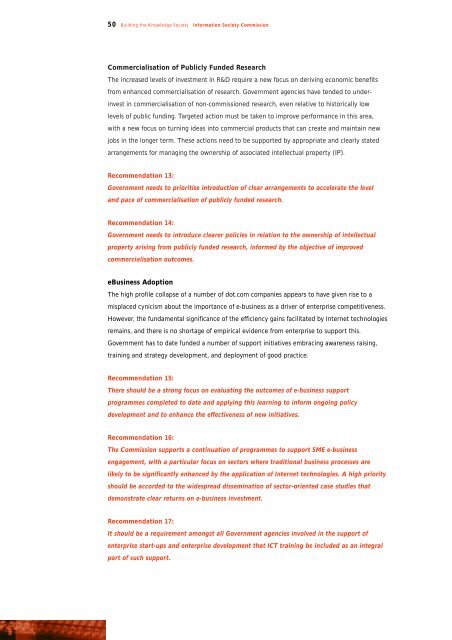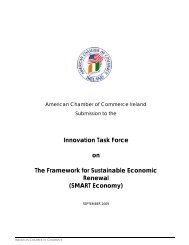Building the Knowledge Society - Department of Communications ...
Building the Knowledge Society - Department of Communications ...
Building the Knowledge Society - Department of Communications ...
Create successful ePaper yourself
Turn your PDF publications into a flip-book with our unique Google optimized e-Paper software.
50 <strong>Building</strong> <strong>the</strong> <strong>Knowledge</strong> <strong>Society</strong> Information <strong>Society</strong> CommissionCommercialisation <strong>of</strong> Publicly Funded ResearchThe increased levels <strong>of</strong> investment in R&D require a new focus on deriving economic benefitsfrom enhanced commercialisation <strong>of</strong> research. Government agencies have tended to underinvestin commercialisation <strong>of</strong> non-commissioned research, even relative to historically lowlevels <strong>of</strong> public funding. Targeted action must be taken to improve performance in this area,with a new focus on turning ideas into commercial products that can create and maintain newjobs in <strong>the</strong> longer term. These actions need to be supported by appropriate and clearly statedarrangements for managing <strong>the</strong> ownership <strong>of</strong> associated intellectual property (IP).Recommendation 13:Government needs to prioritise introduction <strong>of</strong> clear arrangements to accelerate <strong>the</strong> leveland pace <strong>of</strong> commercialisation <strong>of</strong> publicly funded research.Recommendation 14:Government needs to introduce clearer policies in relation to <strong>the</strong> ownership <strong>of</strong> intellectualproperty arising from publicly funded research, informed by <strong>the</strong> objective <strong>of</strong> improvedcommercialisation outcomes.eBusiness AdoptionThe high pr<strong>of</strong>ile collapse <strong>of</strong> a number <strong>of</strong> dot.com companies appears to have given rise to amisplaced cynicism about <strong>the</strong> importance <strong>of</strong> e-business as a driver <strong>of</strong> enterprise competitiveness.However, <strong>the</strong> fundamental significance <strong>of</strong> <strong>the</strong> efficiency gains facilitated by Internet technologiesremains, and <strong>the</strong>re is no shortage <strong>of</strong> empirical evidence from enterprise to support this.Government has to date funded a number <strong>of</strong> support initiatives embracing awareness raising,training and strategy development, and deployment <strong>of</strong> good practice.Recommendation 15:There should be a strong focus on evaluating <strong>the</strong> outcomes <strong>of</strong> e-business supportprogrammes completed to date and applying this learning to inform ongoing policydevelopment and to enhance <strong>the</strong> effectiveness <strong>of</strong> new initiatives.Recommendation 16:The Commission supports a continuation <strong>of</strong> programmes to support SME e-businessengagement, with a particular focus on sectors where traditional business processes arelikely to be significantly enhanced by <strong>the</strong> application <strong>of</strong> Internet technologies. A high priorityshould be accorded to <strong>the</strong> widespread dissemination <strong>of</strong> sector-oriented case studies thatdemonstrate clear returns on e-business investment.Recommendation 17:It should be a requirement amongst all Government agencies involved in <strong>the</strong> support <strong>of</strong>enterprise start-ups and enterprise development that ICT training be included as an integralpart <strong>of</strong> such support.
















